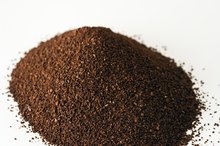Does Caffeine Cause Blood Clots?
Caffeine, in its various forms, is one of the most popular and widely used drugs and food additives in the world, with around 90 percent of people ingesting it in one form or another, according to the U.S. Food and Drug Administration. It occurs naturally in over 60 plants, such as coffee beans and tea leaves, and it is often added to foods, drinks and medicines. As of August 2011 a link between caffeine and blood clots is currently being explored, because of the former’s effect on blood and heart rate.
What Does Caffeine Do?
Caffeine stimulates the central nervous system, affecting the brain and spinal cord, the International Coffee Organization explains. Every individual has a different reaction to caffeine, but generally the main effect is enhancement of alertness. It helps counter fatigue and improves mental performance. However, caffeine may also have negative side effects in sensitive individuals, such as heart arrhythmia, headaches and dehydration. It may also delay the onset of sleep and decrease sleep time, and lead to anxiety, nervousness and irritability.
- Caffeine stimulates the central nervous system, affecting the brain and spinal cord, the International Coffee Organization explains.
- However, caffeine may also have negative side effects in sensitive individuals, such as heart arrhythmia, headaches and dehydration.
Effect on High Blood Pressure
Can Coffee Lower Blood Sugar Levels?
Learn More
Caffeine can have a significant but temporary effect on blood pressure, as a 2000 study in the American Heart Association’s “Hypertension” journal found. After testing men with and without existing hypertension, the researchers discovered that blood pressure in all groups was raised after ingesting caffeine. However, the effect was much greater in the men who had already been diagnosed with high blood pressure, with a post-caffeine change 1.5 times greater than those with optimal blood pressure. This change, though temporary, may already be enough to cause damage to arteries. Individuals with hypertension should limit their caffeine consumption.
- Caffeine can have a significant but temporary effect on blood pressure, as a 2000 study in the American Heart Association’s “Hypertension” journal found.
- After testing men with and without existing hypertension, the researchers discovered that blood pressure in all groups was raised after ingesting caffeine.
Effect on Blood Clots
Coffee may have an indirect effect on blood clot formation, according to a 2008 study published in the "British Journal of Nutrition." The research team found that coffee inhibits the aggregation of platelets, the colorless, irregularly shaped components of blood that come together to create clots. Clots that form inside blood vessels can lead to stroke and cardiovascular disease. However, it is important to note that it is not caffeine itself that helps prevent the blood clots, but the beneficial antioxidant properties offered by the polyphenol compounds found within coffee.
- Coffee may have an indirect effect on blood clot formation, according to a 2008 study published in the "British Journal of Nutrition."
- The research team found that coffee inhibits the aggregation of platelets, the colorless, irregularly shaped components of blood that come together to create clots.
Factors that Promote Blood Clots
How Caffeine Affects the Nervous System
Learn More
While caffeine itself does not promote the formation of blood clots, it also does not seem to offer any notable benefit for their treatment. However, various other factors may increase your risk for thrombosis and stroke, the World Heart Federation notes. These include atherosclerosis, hypertension, damage to blood vessels due to physical injury, inflammation or radiation, being more than 10kg overweight, physical inactivity, smoking, immobility and using contraceptive pills or estrogen replacement medication.
Related Articles
References
- "British Journal of Nutrition"; Effect of coffee drinking on platelets: inhibition of aggregation and phenols incorporation; F. Natella et al; December 2008
- "Hypertension"; Hypertension Risk Status and Effect of Caffeine on Blood Pressure; Terry Hartley et al; 2000
- Meredith SE, Juliano LM, Hughes JR, Griffiths RR. Caffeine Use Disorder: A Comprehensive Review and Research Agenda. J Caffeine Res. 2013;3(3):114-130. doi:10.1089/jcr.2013.0016
- Richards G, Smith AP. A Review of Energy Drinks and Mental Health, with a Focus on Stress, Anxiety, and Depression. J Caffeine Res. 2016;6(2):49-63. doi:10.1089/jcr.2015.0033
- Brunyé TT, Mahoney CR, Rapp DN, Ditman T, Taylor HA. Caffeine enhances real-world language processing: evidence from a proofreading task. J Exp Psychol Appl. 2012;18(1):95-108. doi:10.1037/a0025851
- Koppelstaetter F, Poeppel TD, Siedentopf CM, et al. Caffeine and cognition in functional magnetic resonance imaging. J Alzheimers Dis. 2010;20 Suppl 1:S71-84. doi:10.3233/JAD-2010-1417
- Harrell PT, Juliano LM. Caffeine expectancies influence the subjective and behavioral effects of caffeine. Psychopharmacology (Berl). 2009;207(2):335-42. doi:10.1007/s00213-009-1658-5
- Lucas M, O'reilly EJ, Pan A, et al. Coffee, caffeine, and risk of completed suicide: results from three prospective cohorts of American adults. World J Biol Psychiatry. 2014;15(5):377-86. doi:10.3109/15622975.2013.795243
- Abdel-Hady H, Nasef N, Shabaan AE, Nour I. Caffeine therapy in preterm infants. World J Clin Pediatr. 2015;4(4):81-93. doi:10.5409/wjcp.v4.i4.81
- American Psychiatric Association. Diagnostic and Statistical Manual of Mental Disorders. 5th edition. Washington DC; 2013.
- Turnbull D, Rodricks JV, Mariano GF, Chowdhury F. Caffeine and cardiovascular health. Regul Toxicol Pharmacol. 2017;89:165-185. doi:10.1016/j.yrtph.2017.07.025
- Centers for Disease Control and Prevention. Alcohol and Caffeine. Updated October 23, 2018.
- Alsunni AA. Energy Drink Consumption: Beneficial and Adverse Health Effects. Int J Health Sci (Qassim). 2015;9(4):468-474.
- Lyngsø J, Ramlau-Hansen CH, Bay B, Ingerslev HJ, Hulman A, Kesmodel US. Association between coffee or caffeine consumption and fecundity and fertility: a systematic review and dose-response meta-analysis. Clin Epidemiol. 2017;9:699-719. doi:10.2147/CLEP.S146496
- U.S. Food and Drug Administration. Pure and Highly Concentrated Caffeine. Updated September 21, 2018.
- National Institute on Drug Abuse. Drugs, Brains, and Behavior: The Science of Addiction. Updated July 2018.
Writer Bio
Joseph Pritchard graduated from Our Lady of Fatima Medical School with a medical degree. He has spent almost a decade studying humanity. Dr. Pritchard writes as a San Francisco biology expert for a prominent website and thoroughly enjoys sharing the knowledge he has accumulated.









